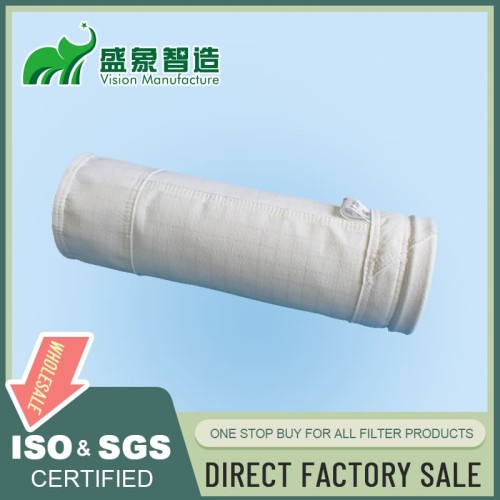
The Role of Polyester Filter Bags in Air Pollution Control
Mechanisms of Air Filtration
Polyester filter bags play a crucial role in air pollution control through several key mechanisms:
Capture of Particulate Matter: These bags are designed to capture fine particulate matter (PM) from industrial exhaust gases. As contaminated air passes through the filter bags, particulates are trapped on the surface or within the fibers, allowing clean air to exit the system.
Fabric Filtration: Polyester filter bags are made from durable and chemically resistant polyester fibers. The fabric is woven in such a way that it allows air to pass through while capturing dust and other particulates. The surface filtration provided by polyester filter bags, especially those with PTFE membranes, ensures high efficiency in dust cake release and filtration.
Cleaning Mechanisms: Polyester filter bags are often used in baghouses that employ various cleaning mechanisms such as pulse jet, reverse air, and mechanical shaking. These mechanisms periodically clean the filter bags by purging the accumulated dust, thereby regaining the filter's permeability and ensuring continuous airflow.
Types of Pollutants Captured
Polyester filter bags are effective in capturing a wide range of pollutants:
Dust and Particulates: These bags are highly efficient in capturing fine dust and particulate matter, including PM2.5, which is critical for meeting stringent emissions standards.
Gaseous Pollutants: While primarily designed for particulate capture, polyester filter bags can also be used in conjunction with other technologies to control gaseous pollutants. For example, they can be treated with chemicals to enhance their ability to capture acid gases and other pollutants.
Chemical and Industrial Emissions: Polyester filter bags are used in various industrial applications, including cement plants, steel mills, and chemical manufacturing, to capture pollutants such as sulfur dioxide, nitrogen oxides, and other harmful emissions.
Regulations and Compliance
Polyester filter bags are designed to help industries comply with environmental regulations and health standards:
OSHA and EPA Standards: These filter bags are developed to limit exposure to particulate matter to less than 15 mg/m³, as per OSHA limits, and to comply with air quality standards for PM2.5 set by the EPA.
Industry-Specific Regulations: In sectors such as cement manufacturing, mining, and chemical processing, polyester filter bags help maintain air quality and ensure compliance with industry-specific regulations. They are essential for preserving clean air conditions and adhering to health and safety standards.
Case Studies of Successful Implementations
Several case studies highlight the effectiveness of polyester filter bags in air pollution control:
Cement Industry: In cement plants, polyester filter bags have been successfully used to control dust emissions from kilns and dryers. For instance, a cement plant in India reduced its PM2.5 emissions by over 90% by implementing a baghouse system with polyester filter bags.
Steel and Metal Processing: In steel mills, polyester filter bags have been effective in capturing fumes and particulates from metal melting and processing operations. A study in the steel industry showed a significant reduction in airborne pollutants and improved worker safety after the installation of a pulse jet baghouse system using polyester filter bags.
Chemical Manufacturing: In chemical plants, polyester filter bags with PTFE membranes have been used to filter out hazardous chemicals and particulates. A chemical manufacturing facility reported a reduction in emissions and improved air quality after switching to polyester filter bags with PTFE membranes.
Conclusion
Polyester filter bags are a critical component in air pollution control, offering high filtration efficiency, durability, and chemical resistance. By understanding the mechanisms of air filtration, the types of pollutants captured, and the regulatory compliance requirements, industries can effectively utilize these filter bags to maintain clean air conditions and protect the environment. Successful implementations across various industries demonstrate the effectiveness of polyester filter bags in achieving these goals.

